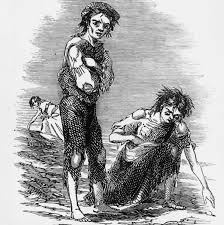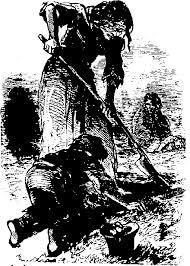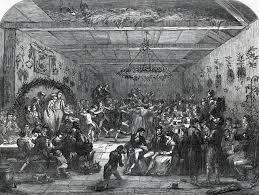Sitcom from Purgatory
On January 1st of this year, myself and many others were shocked of news that a British television outlet (Channel 4) is funding a sitcom about the “famine in Ireland.” Hugh  Travers, an Irish writer is behind it and was quoted as describing it as, “���we���re kind of thinking of it as ‘Shameless’ in famine Ireland.��� (Showtime’s ‘Shameless’ chronicles the hilarity involved with��a drunk father of six).
Travers, an Irish writer is behind it and was quoted as describing it as, “���we���re kind of thinking of it as ‘Shameless’ in famine Ireland.��� (Showtime’s ‘Shameless’ chronicles the hilarity involved with��a drunk father of six).
I wasn’t planning on writing about it as I’m deep into the second book in the Auld Irishtown trilogy, but the controversy hasn’t gone away. When I heard the writer behind the Irish show Father Ted, Graham Linehan, was supporting the network’s plans for a sitcom on the famine, I tweeted my opinion to him after he tweeted about “the idiots protesting the famine sitcom.”
@Glinner up with protests of inflammatory actions.
— Eamon Loingsigh (@eamonLoi) January 17, 2015
In response, he tweeted back:
@eamonLoi the writer is Irish, you fuckin moron.
— Graham Linehan (@Glinner) January 17, 2015
For which I tweeted back again:
@Glinner Funded by British television. No ending to an old tradition… gombeens & shoneens. No need for being crude, it's an opinion.
— Eamon Loingsigh (@eamonLoi) January 17, 2015
Not that the world is concerned about my opinion, but I would like to say just a few words. First off, describing this as a sitcom about a “famine” in Ireland is very quickly offending many people. There was a famine on the potato in Ireland, yes, but there was not a famine on food in general in Ireland. In fact, it is extremely well chronicled by award-winning writers all over the world that England, who used Ireland as one of its colonies, exported millions of dollars worth of grain, beeves of cattle, ham, oat, provisions and much, much more during the worst years of what the Irish have come to call The Great Hunger, or An Gorta Mor.
Here is a video of Christy Moore, a famous Irish musician listing off the British exports on the day of September��14, 1847.
It was for this Great Hunger that so many Irish came to port cities like New York, Boston, Philadelphia and Canada, Australia and more. Boney, starved, sick from more than a month-long journey in the worst ships in the British empire by pirates that sought to profit from the catastrophe. They became known as “coffin ships” because so many Irish died in the hulls or, being left on the deck to the elements of the sea, died on the way to America and were dumped overboard. Some ships sunk on the way.��
Worse off were those that did not have landlords that paid their passage and were stuck in Ireland. More than a million having died a very slow and horrifying death due to hunger and diseases carried by lice, yellow fever, cholera. To add shame on the shame, many were evicted, often during the winter, left to die on roadsides alone. Children were the most vulnerable and died in the worst poverty Europe had known in centuries. Drawings of women gaunt and crying for their babies. Dying themselves not long afterward. Homeless and despised.
The Acts of Union, forced upon Ireland by the English in 1800 clearly outline that Ireland was part of the��British Empire and therefore responsible for the welfare of its people. But the British mercantilists, closely associated with the English Parliament, strictly believed in the��economic��philosophy of Laissez Faire. Or, abused this “hands off” economic approach to its benefit, many argue. Irish peasants on English lands (within Ireland) were not as profitable as grazing cattle and beef, and so the landlords lobbied against helping the starved and dying.
Those in power also used God against the peasants in Ireland, stating that the famine was a divine intervention, and sited His Providence as a reason the Irish suffered because of their supposed laziness, feckless nature.
During this time period, the British Parliament made half-hearted attempts to help with schemes such as road building, though many died working on these roads that didn’t pay enough to feed families in any case. Workhouses were supposed to be places to shelter the evicted and starved, but instead came to be places to die in. There were also the soup kitchens, some of which became famous because many of them required the starved and dying to renounce their Catholicism for British Protestantism.
enough to feed families in any case. Workhouses were supposed to be places to shelter the evicted and starved, but instead came to be places to die in. There were also the soup kitchens, some of which became famous because many of them required the starved and dying to renounce their Catholicism for British Protestantism.
During this time period, some of the more well-off Irish took advantage of the situation and gave loans out at exorbitant interest rates. These Irish became known as gombeens and were reviled by the Irish for generations.
These are all true stories. Even the English do not deny they occurred. Cannot deny it. But still to this day, the Great Hunger is mostly ignored and oftentimes made fun of by the English, who long for the heyday of the British Empire. It is, without being divisive or polarizing,��a horrible chapter in world history as reprehensible as the enslaving of Africans or a Holocaust against Jews. And for the Irish (and even some Americans like myself), it is still as inflammatory.
Can you imagine it? A British television outlet funding a COMEDY about the Great Hunger? Wait though, can you imagine a British television outlet funding a comedy about the Great Hunger WRITTEN BY AN IRISHMAN? There could be nothing more inflammatory than going through with this, unless of course Germany planned to fund a comedy about the Holocaust written by a self-hating Jew. Or Americans fund a sitcom about slavery, written by a pandering black man because writing a comedy about the Great Hunger by a gombeen will cause great chaos.
Comedy on Irish famine stifles free speech? No, just bad taste. Like drawing sexpics of others' god, yell fire in a theatre & you get chaos.
— Eamon Loingsigh (@eamonLoi) January 17, 2015




